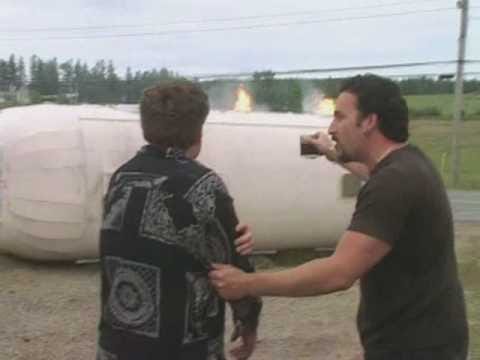Well, it’s been a while. I’ll skip a preamble, but I appreciate you hanging on and hope you enjoy the below.
While we have all cycled through coping mechanisms, my broken brain continues to return to Trailer Park Boys, a cult classic Canadian TV show that ran on-and-off for more than a decade. As if helmed by Mike Judge’s Canadian brother, TPB superimposes adult Beavis & Buttheads into a more gonzo live-action version of King of the Hill, whereby Nova Scotia replaces Arlen, Texas.
For the uninitiated, it features a pair of three friends (Boys) who reside and spend all of their days in a trailer park (Trailer Park). They scheme and cajole and fight with the other residents who all have their shallow arcs.
While these schemes manifest (always with some core fatal issue dooming them from the start), they are trailed by the purported figures of authority, the perpetually intoxicated trailer park supervisor and his paramour boyfriend, whose impressively smooth beer gut is always visible as he is always shirtless.
There is a calming sameness to the show. There’s no pretense of days going by, only reference to schemes present and past. Many characters always wear the exact same clothes, literally in every season. One character, Julian, always has a half-drunk rum and coke in his hand, even when they escape the Trailer Park bottle and enter the world, a truly inspired sight gag that never gets old. Regardless of whether he is in a car, in court or in jail, or exiting a flipped car after a police chase.
If The X-Files was a show that alternated between the “monster of the week” format and the alien mythology, TPB had its “petty larceny of the week” and, well, not much to speak of a prevailing narrative of greater importance. Episodes outrank their peers on the execution of the pratfalls and comedowns from the highs of success.
No one is richly drawn. No one learns or is redeemed. No one even bothers seeking redemption. Flashes of enlightenment whiz by and are forgotten quickly. No one is really “capital L” likable. In the less capable hands of anyone else, it would feel exploitative. There’s a white rapper appropriating street slang, everyone is inhaling substances of varying potency consistently while ostensibly caring for their children. The trailer park supervisor abuses alcohol with an abandon that should have killed him seasons ago (worth a quick mention that the actor playing the supervisor had rarely ever drunk, making his constant “inebriation” acting all the more impressive).
Why does this Nova Scotia-based TV show featuring a trailer park so consistently tap-dance on the brain of this NYC-apartment-dwelling writer? Well, reader, it is because I recognize in this world the general conceit of TPB.
We’re not mad at the characters in Trailer Park Boys because they’re generally terrible people and are always scheming to pilfer from each other. We don’t laugh at them derisively because of their desultory and doomed-to-fail exploits, inimical and harmful activities, and recidivism.
Julian, Bubbles, Ricky, Lahey, and Randy don’t win because they’re stupid or reckless, though they are, and that certainly compounds their downfalls. They don’t win because they can’t win - there is no escape from their Trailer Park just as it is harder to see an escape from our world’s delineation between the haves and the have nots. The haves are few and powerful, and the have nots are numerous but unable to effect change.
Too many of the have nots (whose lives are relatively unencumbered compared to the less fortunate) have convinced themselves that they are, in fact, haves, throwing weight behind those who press the scale down to the rest.
We get the Boys on an unconscious level because we see comparisons; we notice that the deck is stacked, and the dealer is blind to their plight.
Within the trailer park, Jim Lahey holds a modicum of authority but only by virtue of his station. That authority is not only ignored by those who he purportedly lords over, but by the various external authority figures who sporadically descend to preside over incidents beyond his control. As with all other central plot points, there is no illusion that Lahey had anyone’s respect or admiration. But, again, it’s not a matter of his inveterate alcoholism or poor choices; it’s ipso facto - by nature the trailer park supervisor is of and from the trailer park and therefore no different than the criminals he chases.
At varying points in the series, Ricky becomes the assistant trailer park supervisor, and Lahey is removed from his position. If you thought this would change anything or anyone, you would have to squint to see it. Ricky uses that authority to shield his burgeoning marijuana growing enterprise.
The badge does nothing because there’s nothing to be done. Ricky is not smart, but he’s not dumb. He was still the same person in the same place with zero prospects. Might as well try a new scheme. It’s all the same anyway.
